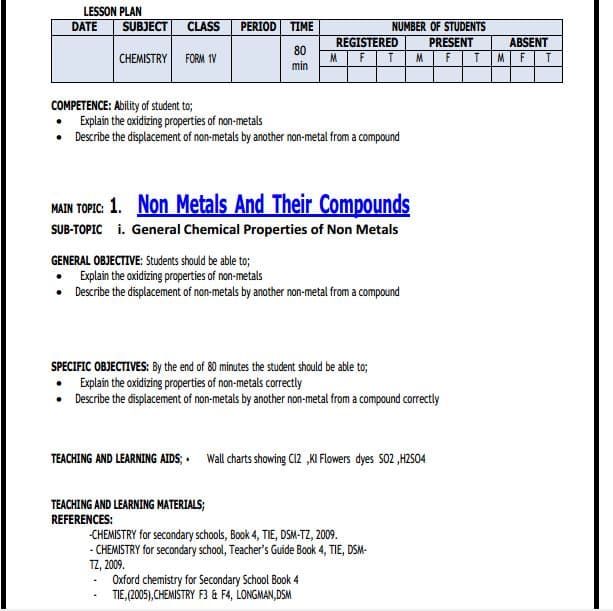SCHEME OF WORK AND LESSON PLAN FORMATS | PLANNING AND PREPARATION FOR TEACHING | SCHEMES OF WORK FOR O-LEVEL AND A-LEVEL
Download best lesson plans and Schemes of work for Secondary schools O-level and A-Level Tanzania.
Teachers should prepare thoroughly before teaching begins
Preparation can be done daily, weekly, monthly or annually.
Good teaching is a results of good planning
This unit deal with four sub-units namely:
- Scheme of work
- Lesson plan
- Lesson notes
- Subject logbook
In these sub-units we will look at their concept, components, characteristics and how to prepare them.
Good teaching is a results of good planning. Teachers should prepare thoroughly before teaching begins
Preparation can be done daily, weekly, monthly or annually.
L ESSON PLANS.
What is a Lesson plan?
A lesson plan is a teacher's detailed description of the course of instruction, or 'learning trajectory' for a lesson.
SAMPLE OF LESSON PLAN FOR SECONDARY SCHOOL TANZANIA.
Lesson plan is a summary of all the important steps in the development of a lesson.
Through the lesson plan you may see clearly what the teacher and learner will be doing at every stage of lesson development
PARTS OF LESSON PLAN.
- Introduction,
- Lesson development
- Culmination.
INTRODUCTION PART OF LESSON PLAN.
This comprises of name of the subject, Matrix (date, class, period, time and number of students), competence, main and specific objectives, main topic, subtopic, T/L materials and references
- Competence. A statement which specifies the performance that should be attained in particular lesson. One competence can be achieved by different lessons.
- Main/general objective. A statement which states behavior to be exhibited by the pupils at the end of the topic/sub-topic.
- Main topic. The concept/topic through which the specified competence will be attained.
- Sub Topic. The content/topic through which the specified competence will be attained within the period.
- Specific Objective. A statement which states a specific behavior to be shown by the student within the lesson.
- Teaching/Learning resources/materials. A list of T/L materials that will be used in T/L of the particular lesson.
- References. A list of publications which will be used to prepare a particular lesson.
LESSON DEVELOPMENT STAGES
Lesson development mainly describes the process of teaching and learning.This part comprises of the following;
- Introduction
- New knowledge
- Reinforcement/application
- Reflection
- Consolidation/conclusion
Find out on what students already know
Stimulate students interest in the lesson
arouse an inquisitive mind in students.
introduce knew knowledge
check if students are following the discussion/activities
Clarify any misconceptions that may develop as the lesson proceeds
encourage students to contribute to the knowledge being presented
Link the present knowledge to real world situation
Discuss the rationally of the knowledge
Get the feelings/opinions of students and the teacher on: the KNOWLEDGE presented, strategies/techniques used to present the knowledge, teaching aids used
Summarizes the lesson presented.
Find out whether any misconception still exist after the presentation of knew knowledge and harmonize
Give assignment/activity which will promote learning.
Features of a good lesson plan.
- Lesson plan must specify clearly the teaching and learning activities.
- Lesson plan must show how each of the planned specific objectives will be realized.
- Lesson plan must give room for maximum learner involvement through activities.
Importance of lesson plan.
- Lesson plan helps to manage time
- It helps teacher to be confident during teaching and learning process.
- Lesson plan enables the teacher to manage the class.
- It helps to teach systematically.
- The lesson plan provides the basis for future plan.
- Helps the teacher to plan lesson which cater for different students.
SCHEMES OF WORK.
What is Scheme of work?
Scheme of work is a long term plan which is prepared by the teacher for a week, month or a term in order to facilitate the process of teaching and learning.
Some teachers wrongly claim that they are knowledgeable,
skillful and experienced enough to continue teaching without any scheme of
work.
Such teachers end up doing work haphazardly or in trial and
error manner and they finally fail and embarrass both learners and the school
authority.
You are strongly advised to prepare your subject scheme of
work always before the school term starts
CHARACTERISTICS OF SCHEME OF WORK.
- It derived from the syllabus
- It shows a logical sequence of topics and sub-topics to be taught at a specific tim
- The scheme of work has different components divided into two parts,namely introductory part and matrix part.
COMPONENTS OF SCHEME OF WORK
The components of scheme of work are divided into two parts:
- Introductory part
- Matrix part
The introductory part
This part contain the following:
- Ministry: This part show the ministry of Ed.
- Year: This part show the year in which the scheme of work will be implemented
- Name of school: Show where the teacher is working
- Name of the teacher: show the teacher who planned and who is going to use the scheme of work.
- Term: Show the term in which the scheme of work will be implemented.
- Subject: Show the name of specific subject.
- Class: Show the name of the specific class.
The matrix part.
This part contain 13 components:
- Competence
- Specific objectives
- Month
- Week
- Main topic
- Sub topic
- Period
- Teaching activities
- Learning activities
- Teaching/learning materials
- Reference book
- Assessment
- Remarks
Description of matrix components.
Competence: Is a statement which specifies the ability that is expected to be exhibited by learners after they have gone through the topic(s) for a given class. It derived from the syllabus.
One competence can be build by a combination of subtopics
and specific objectives.
Objectives: These are statements which specify the behavior
to be showed by the learners. these statements are derived from the topic in
the syllabus.
Month: Is a column that indicate the month in which the
topic will be taught.
Week: Is a column that indicates the week in which topic or
subtopic will be taught.
Main topic: This column indicates the topics which will be
taught in that particular month.
Sub topic: This specifies the area/ subtopic of the topic to
be covered.
Periods: A column that indicates number of periods budgeted
for a particular topic or subtopic.
Teaching activities: A column that indicates a list of
operational activities which will carried out by the teacher in the process of
teaching a particular topic or subtopic.
Learning activities: A column that indicates activities which the learner will perform in the process of learning a particular topic or subtopic.
Teaching/learning resources or materials:
A column that indicates a list of teaching aids that will be
used to facilitate teaching and learning a particular topic or sub topic.
References: A column which indicates a list of textbooks,
supplementary books or any other resources that will be used in teaching and
learning a particular topic/subtopic.
Assessment: A column which indicates the kind of assessment that students will be subjected to. This will ensure that assessment of learners as well as process of teaching and even the materials used are assessed so as to allow for improvement in future.
Remarks: A column used by the teacher to fill his/her
comments about how far the topic/specific objectives have been achieved as well
as appropriateness of materials and process.
SIGNIFICANCE OF SHEME OF WORK.
- Helps to plan for future teaching.
- Remind teachers on the covered topics.
- It helps teachers to teach content within a given period of time.
- It helps the teacher to regulate speed of teaching.
- It enables the teacher to teach systematically.
- It help the teacher to prepare lesson plan
- It is useful during handing over of teachers.
- It helps the teacher to be confident when planning for teaching.










Comments
Post a Comment